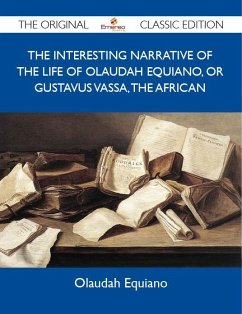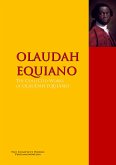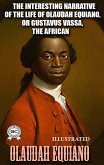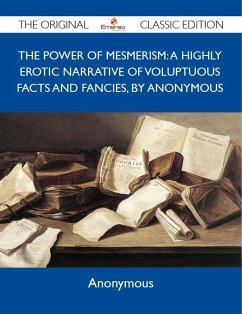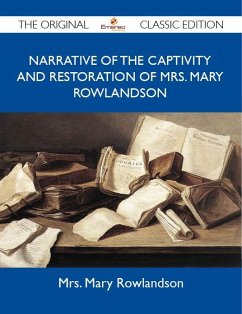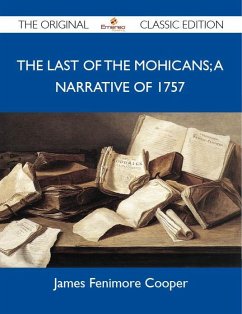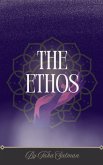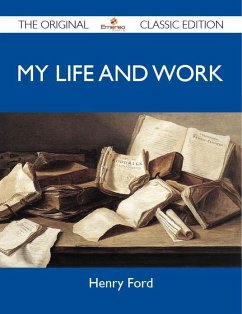The Interesting Narrative (1789) is one of the earliest slave narratives, a genre that includes classics such as Uncle Toms Cabin (1852), Narrative of the Life of Frederick Douglass (1845) and neo-slave narratives like Alex Haleys Roots (1976), Toni Morrisons Beloved (1987) and Edward P. Jones The Known World (2003). What makes Olaudah Equianos account unique is that is was the first slave narrative to find a wide audience, and it is not hard to understand why - not only is it a good story, but it is very well written, almost literary - it sold so well it was a cornerstone in bringing about public sympathy and support for the abolition of the slavery in England.
Just about everything we know about Olaudah Equiano is from his autobiography. He was born around 1745 in Africa, kidnapped and enslaved at the age of 10 or 11 and shipped across the Middle Passage to the West Indies, and soon after to a Virginia plantation (he was too small to work the sugar cane fields). From there he had the good fortune to be purchased by the captain of a British warship, where he learned English manners, language and customs - and a promise of freedom. But, in one of the great blows of his life, he was tricked and sold back into slavery in the West Indies, where he worked on merchant ships for a number of years, finally able to save enough money (trading fruits and rum between ports of call) to buy his freedom in his early 20s. He then spent years as a freed man working on merchant and military ships traveling extensively around the Atlantic, including a trip to the Arctic. His close calls with death were many, including disease, shipwrecks and run-ins with whites who would beat him to within an inch of his life. Equiano eventually settled down in England, married a white girl, had two children and died a wealthy and respected gentleman, a remarkable achievement for a former African slave in the 18th century.
_The Interesting Narrative_ can be read on multiple levels. It is a fascinating first-hand document of 18th century British mercantilism, showing the Atlantic Golden Triangle in action. It is a story of Christian redemption - by following the teachings of the Bible, and those who transgress against it, Equiano explains why things turn out how they do. It is one of the great works of travel literature; exotic locales and death-defying adventures fill the pages. It is a powerful expose of 18th century slavery, unflinchingly detailing the institutionalized horrors and how both victim and victimizer are turned into animals. It is a call for action to end the slave trade.
In the end, we read books like this today with a certain amount of curious detachment, it has been about 150 years since slavery ended - or has it? Some 27 million slaves - more than twice the number of people taken from Africa during the entire 350 year history of the Africa slave trade - today toil in rich and poor countries around the world. Most Americans probably know more about slavery as it once existed, than as it is currently being practiced in their own time, directly touched by the cheap goods we purchase. Reading Equianos account we cant help but be moved against slavery, all slavery, historical or contemporary, and for that the book has immortal value.
Just about everything we know about Olaudah Equiano is from his autobiography. He was born around 1745 in Africa, kidnapped and enslaved at the age of 10 or 11 and shipped across the Middle Passage to the West Indies, and soon after to a Virginia plantation (he was too small to work the sugar cane fields). From there he had the good fortune to be purchased by the captain of a British warship, where he learned English manners, language and customs - and a promise of freedom. But, in one of the great blows of his life, he was tricked and sold back into slavery in the West Indies, where he worked on merchant ships for a number of years, finally able to save enough money (trading fruits and rum between ports of call) to buy his freedom in his early 20s. He then spent years as a freed man working on merchant and military ships traveling extensively around the Atlantic, including a trip to the Arctic. His close calls with death were many, including disease, shipwrecks and run-ins with whites who would beat him to within an inch of his life. Equiano eventually settled down in England, married a white girl, had two children and died a wealthy and respected gentleman, a remarkable achievement for a former African slave in the 18th century.
_The Interesting Narrative_ can be read on multiple levels. It is a fascinating first-hand document of 18th century British mercantilism, showing the Atlantic Golden Triangle in action. It is a story of Christian redemption - by following the teachings of the Bible, and those who transgress against it, Equiano explains why things turn out how they do. It is one of the great works of travel literature; exotic locales and death-defying adventures fill the pages. It is a powerful expose of 18th century slavery, unflinchingly detailing the institutionalized horrors and how both victim and victimizer are turned into animals. It is a call for action to end the slave trade.
In the end, we read books like this today with a certain amount of curious detachment, it has been about 150 years since slavery ended - or has it? Some 27 million slaves - more than twice the number of people taken from Africa during the entire 350 year history of the Africa slave trade - today toil in rich and poor countries around the world. Most Americans probably know more about slavery as it once existed, than as it is currently being practiced in their own time, directly touched by the cheap goods we purchase. Reading Equianos account we cant help but be moved against slavery, all slavery, historical or contemporary, and for that the book has immortal value.
Dieser Download kann aus rechtlichen Gründen nur mit Rechnungsadresse in A, D ausgeliefert werden.

